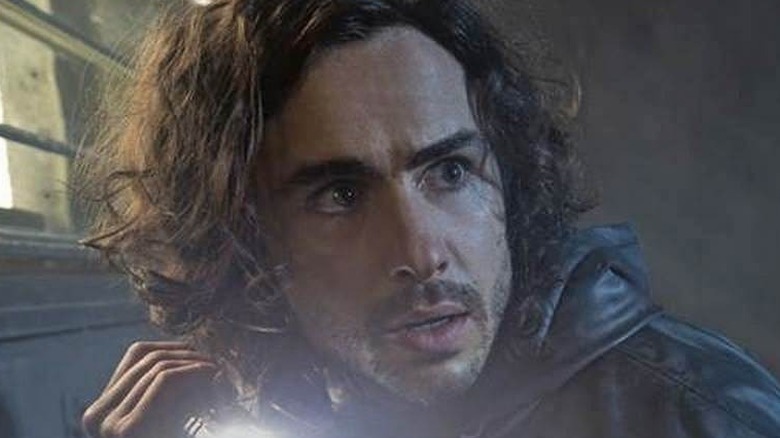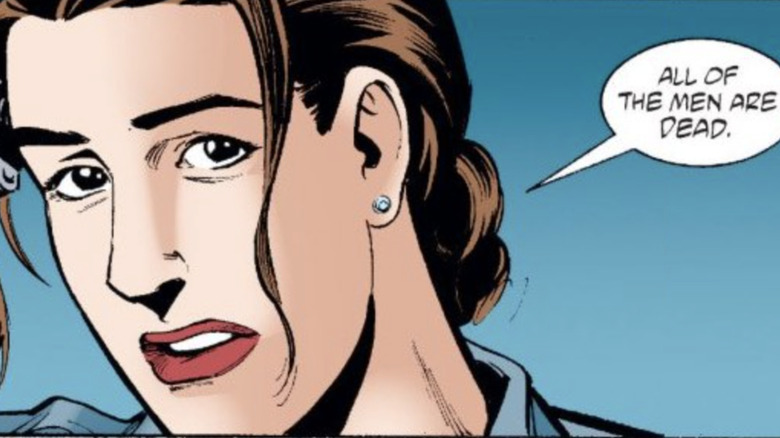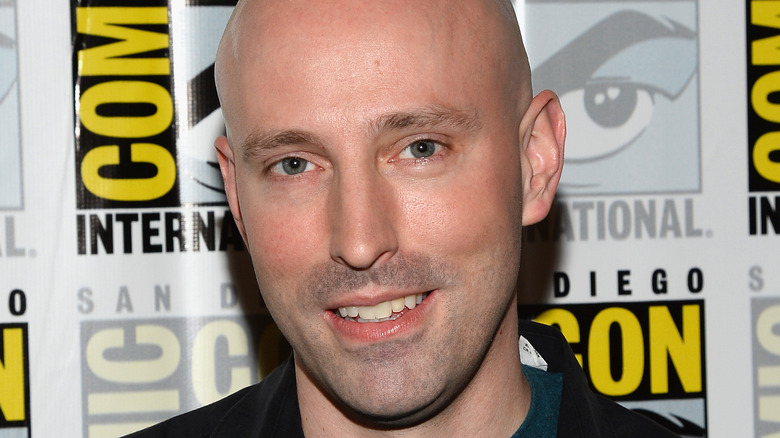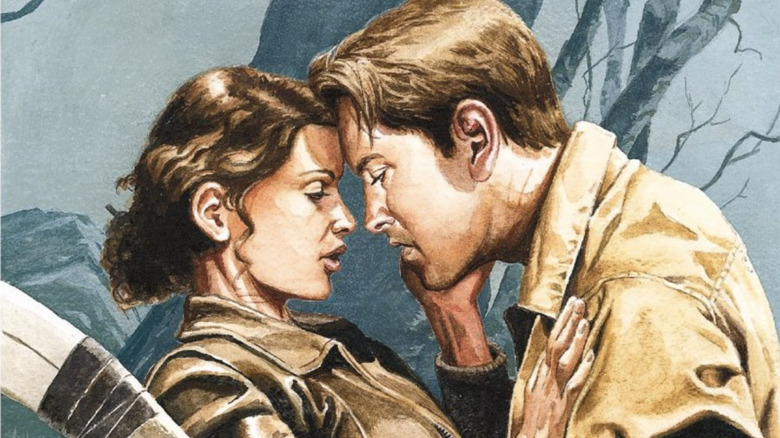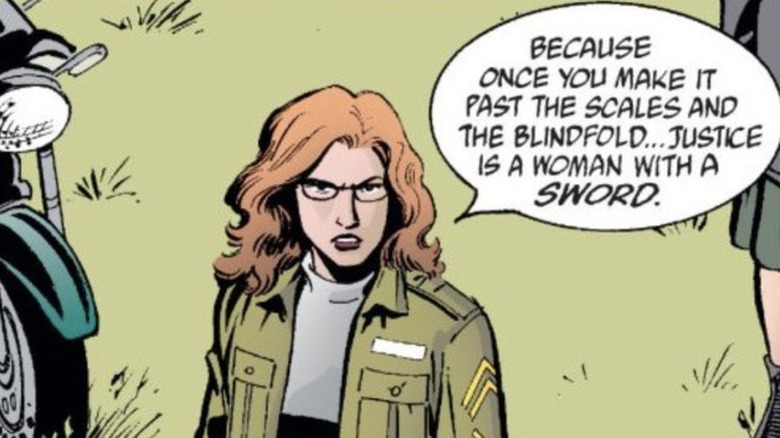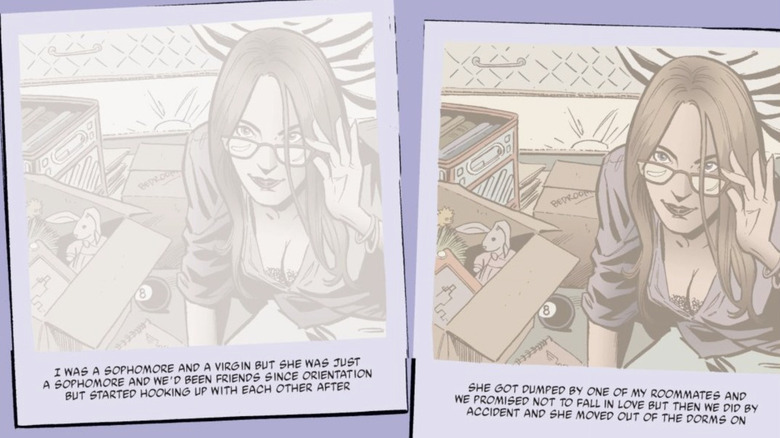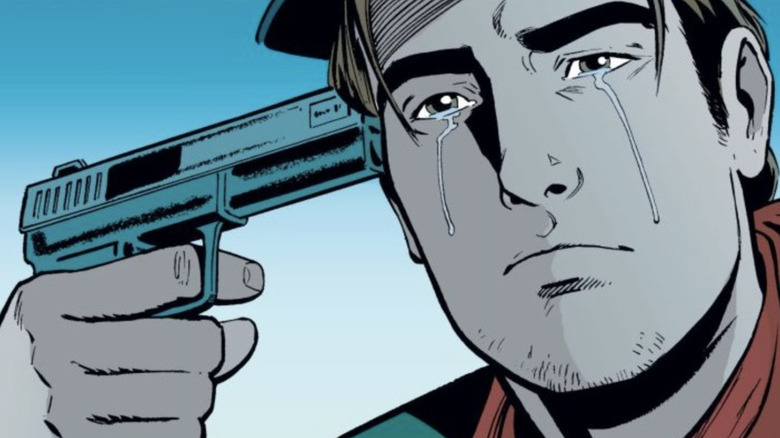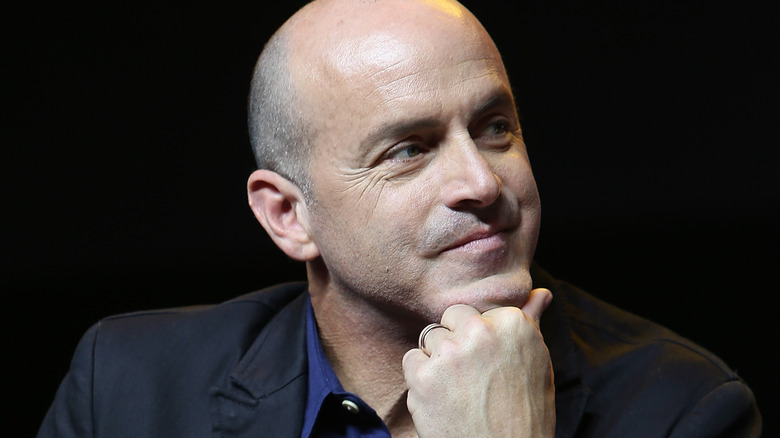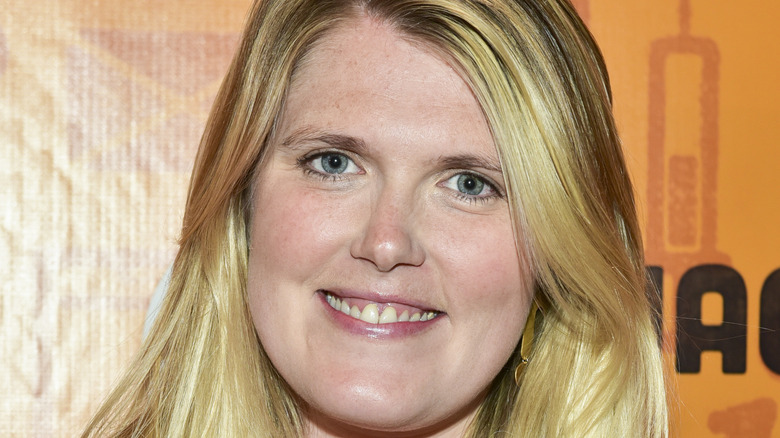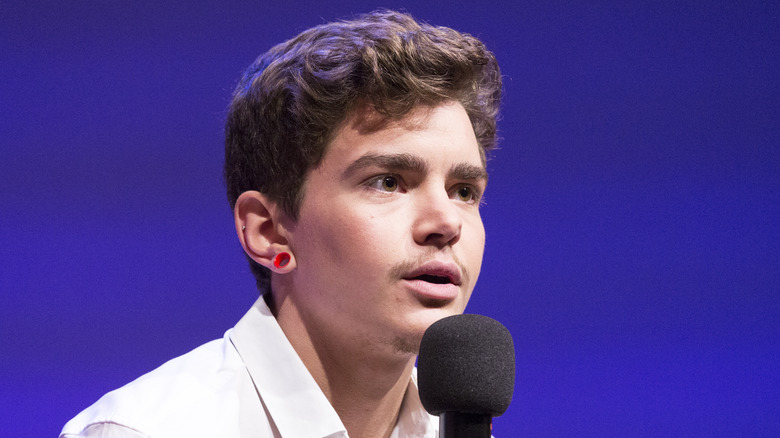The Untold Truth Of Y: The Last Man
Ever wonder what the world would be like if all the men were gone? Or at least, all but one? Wonder no longer — on September 13th, the new series "Y: The Last Man" will begin streaming on Hulu. It's based on the acclaimed comic book of the same name, which was released by DC's Vertigo imprint and unfolded over the course of 60 issues from 2002 to 2008. While it won both the National Comics Award and the Eisner Award (and was nominated for a Hugo), modern comic book fans, particularly those whose tastes run primarily toward the mainstream, can be forgiven for not having heard of it. It's a story that's very clearly of its time — and that doesn't always age well — but that simultaneously feels both surprisingly progressive for the 2000s and surprisingly relevant for the 2020s. It is, in short, a comic crying out for revisitation, and the launch of the FX adaptation provides the perfect opportunity.
While we will do our best to avoid giving away major plot points from the original comic, this article will contain some spoilers, so if you want the untarnished experience, go read the book and come back (it's good, we promise). If that doesn't bother you, let's strap on some gas masks and sift through the shattered ruins of the patriarchy to discover the untold truth of "Y: The Last Man."
It's exactly what it sounds like
If you've seen the trailer for the new show, you already know the premise: One day, for unknown reasons, every man in the world suddenly falls down dead. If you thought maybe the concept would be slightly less on-the-nose, you're out of luck — the "Y" part of the title specifically refers to the Y chromosome, which is the common factor in victims of whatever plague has struck the world, as well as to the name of the book's protagonist, Yorick Brown. The "last" part turns out to be a slight exaggeration, but not by much; Yorick and his pet capuchin monkey, Ampersand, are essentially the last animals left on the planet with a Y chromosome. So if nothing else, you know exactly what you're getting into when you crack open the first issue.
Admittedly, the story does turn out to have more to do with Yorick as a person than with what a world without men looks like and how it functions. But it's still very much a post-apocalyptic tale with a single male character that uses its premise to explore a variety of social issues. It was a compelling concept back in 2002, and perhaps even more so 20 years later.
It was written by Brian K. Vaughan
"Y: The Last Man" was a collaboration between two immensely talented individuals who created the story together. One of them, lead penciller Pia Guerra, isn't terribly well known beyond her work on "Y" — she's contributed to comics released by DC, Marvel, and IDW, but her career in the industry is neither extensive nor particularly celebrated, and she's since become known more as an editorial cartoonist than as a comic book artist. Her co-creator, however, and the writer of "Y," is significantly more notable: Brian K. Vaughan.
A fixture of both mainstream and independent comics for two decades, Vaughan has written for both DC and Marvel over the years, including his well-regarded run on "Swamp Thing" and his original Marvel creation, "Runaways," which itself was recently adapted into a show on Hulu. In more recent years, Vaughan has won acclaim as part of Image Comics, particularly for the sweeping space epic "Saga," which is widely considered to be one of the best books of the modern era. Interestingly, Vaughan also spent three seasons as a writer and producer for "Lost," a job he got due to "Lost" showrunner Damon Lindelof being a huge fan of "Y: The Last Man."
It's about relationships
"Y: The Last Man" is a story about an apocalypse, but like all good apocalypse stories, it's really about people. Looking back on the book's origins, Vaughan recalled to Syfy Wire, "I had just been through a bad breakup," and it shows — romantic relationships are the book's bread and butter, and the comic is full to bursting with them. The central plot is driven by Yorick's desire to track down his girlfriend, Beth, who he had proposed to over the phone immediately before the plague hit, but he has at least four additional love interests (whose relationships with him vary wildly in intensity) over the course of the series. It's the sort of thing you might expect of a story about the last man on Earth, and as you might also expect considering the book's overall tone, most of these relationships end in tragedy.
Yorick's dalliances are far from the only major romances in "Y" — his sister Hero, for example, is broadly shaped by her romantic history and the death of her boyfriend in the plague. "Y" is also notable for its preponderance of queer and non-traditional relationships, from Dr. Allison Mann's romances with Agent 355 and Rose Copen to astronaut Ciba Weber and the baby fathered by one of two men she'd been in space with. Of course, in a world without men, it only makes sense to feature characters who are no longer bound by traditional romantic standards, or who never had been.
It's about gender
It's one thing to come up with a story about all the world's men suddenly dying. It's another to actively engage with the ramifications of that story and how they relate to the conversation about gender, even the extremely outdated conversation of the 2000s. You could write an entire graduate thesis on gender in "Y: The Last Man" (indeed, at least one person already has). Yorick himself is a walking gender studies course –- the last man on Earth, a fairly routine male power fantasy, is in this case a weedy, underachieving amateur magician and escape artist who can quote extensively from literature but who is still very much a child in a man's body. He's nobody's idea of a "real man," a fact that both he and others are frequently forced to grapple with.
Vaughan's and Guerra's exploration of gender expresses itself in a myriad of other areas, as well, including how the all-female world takes shape as the years go on, the reactions of women to Yorick's existence, and the various theories about what actually happened to the men, which run the gamut from the ideas of the violent, militant Daughters of the Amazon — whose leader preaches that the plague is nature cleansing itself — to more scientific theories about cloning and biological weapons. While it's true that "Y's" contribution to gender discourse hasn't aged entirely gracefully (particularly in how it deals with the trans population) it remains impressive that the contribution was made in the first place.
It's about sex
Even more striking than the willingness of "Y" to engage with issues regarding gender is its willingness to engage with issues regarding sex. Obviously the idea of sex has a massive place in this kind of work — the question of humanity's ability or inability to reproduce in the absence of men hangs over the entire series, and at least two major plot points hinge on women having sex and getting pregnant. Where "Y" differs from most other adult-oriented comics, however, is that it tackles subjects like male sexual insecurity, something that simply doesn't exist in most media. This comes up most directly in the "Safeword" arc, which was molded with particular care and creative control by Guerra.
"Safeword" is where "Y" becomes something special, as demonstrated by the fact that it was the first of the book's stories to be nominated for an Eisner Award — Yorick's encounter with Agent 711 is half torture, half sexual temptation, and all acid trip, a dream-like exploration of the protagonist's psyche laced with bondage imagery that reveals Yorick's deep issues with sex and the fact that he was sexually assaulted as a child. It's a place most stories, especially in the male-dominated comic book medium, wouldn't dare to go, and it makes both Yorick and "Y" itself stand out. "Y: The Last Man" might not be for everyone (and the show might not have the courage to faithfully adapt "Safeword") but it's definitely not your typical comic book.
If you or anyone you know has been a victim of sexual assault, help is available. Visit the Rape, Abuse & Incest National Network website or contact RAINN's National Helpline at 1-800-656-HOPE (4673).
It's about survival
While sex, gender, and relationships are integral parts of "Y: The Last Man," it remains fundamentally a post-apocalyptic story, and that means there's one theme underlying all the others: survival. Characters like Yorick and Hero are already survivors of childhood abuse, but the real tale being told is about the trauma of half the world's population dropping dead, and how those who remain try to put themselves and their societies back together.
Even Yorick's revelation of sexual insecurity in "Safeword" turns out to be just a regular thing that people experience sometimes — his real problem, as Agent 711 discovers, is that he has a death wish. He's got the biggest case of survivor's guilt in history, and he doesn't think he deserves to live. As it turns out, the series' primary villain, Alter Tse'elon (who will almost certainly be altered in the TV version from her role as a prominent member of the Israeli Defense Forces) suffers from the same condition. While "Y" deserves all the credit in the world for its efforts to engage with social issues, at its roots, it's a story of what happens to people when the world falls apart around them.
It's no coincidence that "Y" came out soon after the attack on the World Trade Center on September 11, 2001. Vaughan clearly spent some time processing his own feelings of survival after that event, which be seen more explicitly in his Wildstorm series "Ex Machina."
It was going to be a film
The Hulu adaptation is the first time "Y" has been brought to the screen, but it isn't the first attempt. A film version of the story from New Line Cinema got a writer and director (Carl Ellsworth and DJ Caruso, respectively) as far back as 2007, before the comic was even finished. The two had worked together previously on the thriller "Disturbia," which starred Shia LaBeouf, and Caruso had also directed LaBeouf in "Eagle Eye," leading to speculation that LaBeouf would be cast as Yorick. LaBeouf shot down that rumor, however. Zachary Levi was also interested in the role and seemed to be a "Y" fan — his character in "Chuck" is at one point seen reading the comic.
Unfortunately, the movie never got past those initial stages. According to Caruso, the project fell apart as a result of creative differences between him and New Line — while Caruso and Ellsworth were initially re-working a script by Vaughan that condensed the entire series into one film, Caruso felt strongly that it should be a trilogy. New Line didn't agree, so Caruso walked. A subsequent attempt to get the movie made fell through in 2014, and the rights to "Y" returned to the hands of Vaughan and Guerra.
The TV version took a while
Like the attempted movie, the process of adapting "Y: The Last Man" to television has been long and plagued with difficulties. The idea of "Y" as a TV show actually went back at least to 2010, when director Louis Leterrier expressed interest after completing "The Incredible Hulk" and "Clash of the Titans." But it wasn't until 2015 that FX announced the actual development of the show. "Y" was initially placed in the hands of Michael Green, whose credits included "Heroes," "Logan," and "American Gods," alongside Aida Mashaka Croal and Vaughan. But like Caruso before them, Green and Croal ended up leaving the project as a result of creative conflicts, and several of the assembled performers, including Barry Keoghan, Imogen Poots, Lashana Lynch, and Timothy Hutton, were re-cast. If that wasn't enough, production on the show was (ironically) delayed by the COVID-19 pandemic.
Fortunately, 14 years after plans for the film version kicked into motion, an adaptation of "Y: The Last Man," starring Ben Schnetzer as Yorick, is finally seeing the light of day. New showrunner Eliza Clark doesn't have a ton of experience to her name, but she is a playwright, and she did serve as writer and executive producer for the TNT show "Animal Kingdom," as well as co-producer on the CBS program "Extant."
Y: The Last Man arrives at the perfect time
Ironically, all the delays might ultimately have conspired to make "Y: The Last Man" more relevant than ever before. Could there have been a better year than 2021 to release a show based on a comic that explores themes of sex and gender in the middle of a global plague? Now is the perfect time to revisit "Y" — and it's also the perfect time to give an older and outdated story some much-needed updates.
For starters, it's encouraging that a show with such strong gender themes will be directed entirely by women, including the showrunner, for at least the first season. That's something you don't see very often, particularly in comic book adaptations, and it could help "Y: The Last Man" avoid some of the pitfalls of its source material. Beyond that, the adaptation is revising the original story to acknowledge the massive strides made regarding our understanding of gender over the last 20 years, including the creation of a new trans main character (played by trans actor Elliot Fletcher) and, perhaps more importantly, underlining a clear distinction between being a man and having a Y chromosome, which the comic definitively does not do. "Yorick's maleness is not what sets him apart in this world — it's his Y chromosome that sets him apart," Eliza Clark has said. "We are making a show that affirms that trans women are women, trans men are men, non-binary people are non-binary."
